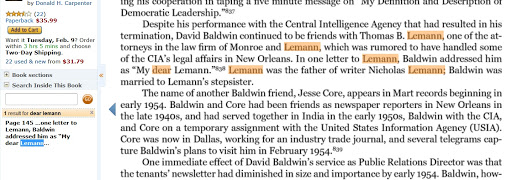Where is the wedding announcement circa 1950 that confirms that Ruth Paine once lived next door to someone who was related to an individual who once was the best man at the wedding of someone who went to school with someone who once knew the son of Allen Dulles? Thereby somehow proving that Paine was the master spy/suburban housewife behind the assassination of JFK. I can just imagine old Ruth baking up some brownies while on the phone to J. Edgar plotting the sinister deed.
Cliff Notes version:
The belief systems of both LNs and CTs are unresponsive to the actual evidence. No one even wants to discuss this entirely reasonable conclusion despite the actual facts. And you certainly do not want to discuss or even evaluate these underpinnings of your own belief system. You are typical and no serious inquiry/evaluation can take place, so any further progress is highly unlikely.
The focus (a diversion) on the TSBD vestibule steps is a result of the unwillingness to consider and address the facts laid out in every post in this young thread, except in yours and MWT's.
In the early 80s, a close friend recently graduated from college interviewed for an entry level position with a major defense contractor.
The interview abruptly ended in response to answering a routine question about family background because the interviewee admitted to having an aunt and uncles residing behind the iron curtain who the interviewee had and would never meet.
Howard Willens's
father deliberately moved himself and Howard's mother into the home directly next to the Accardo residence. Earl Warren vacationed with syndicated newspaper columnist Drew Pearson. Pearson was the source for Tom Clark's late 1940s claim that Henry Crown was at least equal to Accardo, yet Tom Clark chose Crown's son, John as his SCOTUS law clerk for the 1956 term and Warren, Tom Clark, and David Acheson pushed Crown's personal attorney, (Al)Bert E Jenner, Jr., on the WC.
Bush selected Chuckie O'Brien's stepson Jack Goldsmith, as key White House legal advisor in 2001. Jim Garrison never admitted to anyone what Shaw himself was informed of....
https://jfkfacts.org/provocative-prolific-joan-mellen/#comment-869223
Tom S.
April 12, 2016 at 1:25 pm
......
https://www.maryferrell.org/pages/Unredacted_-_Episode_1_-_Transcript.html
Unredacted Episode 1: Transcript of Interview with Joan Mellen
Joan Mellen is the author of A Farewell to Justice: Jim Garrison, JFK’s Assassination, and the Case That Should Have Changed History. This interview was conducted on 22 Feb 2006. Tyler Weaver provided the introduction, and the interview was conducted by Rex Bradford.
…….
REX: I – I think –
JOAN: – when Baldwin was present, he was a CIA asset, his brother worked for the International Trade Mart and Clay Shaw, David Baldwin, and these, these are CIA people…
.....

From Joan Mellen’s book :

......
IOW, Garrison may have been investigating something, and Clay Shaw may have been a defendant, but neither, when you actually look under the hood, actually acted their part.
Posted by (The late, perceptive) Thomas H. Purvis July 19, 2013
.....The "power structure" within New Orleans lies not with those who are currently in what is some temporary political position.
It lies with those who possess the capability to place these persons in the various political positions.
Therefore, Jim Garrison, not unlike any other political figure in New Orleans, did what he was instructed to do or else he suffered the consequences....
https://www.nytimes.com/1974/08/29/archives/nixons-new-lawyer-herbert-john-miller-jr-joins-justice-department.html
Nixon's New Lawyer Herbert John Miller Jr.
Aug. 29, 1974
....
....Joins Justice Department
Mr. Millet proved “so marvelous in that rat's nest,” a former colleague said, that when Mr. Kennedy became Attorney General in 1961 he made Mr. Miller the head of the Criminal Division at the Justice Department.
Under Mr. Miller's direction, the division successfully carried on the long and complicated prosecution of James R. Hoffa, head of the teamsters' union. In addition, Mr. Miller initiated the indictment of Robert G. Baker, who was later convicted of income tax evasion, theft and conspiracy to defraud the Government. Mr. Baker had been secretary to the Senate Democratic majority when Lyndon B. Johnson was the majority leader.
As the most visible Republican in the Justice Department in the administrations of Presidents Johnson and Kennedy, Mr. Miller had to endure a good deal of ribbing.
“Once they bought a copy of the Attorney General's book and presented it to him, with my picture pasted above the title, ‘The Enemy Within,’ “Mr. Miller recalled in an interview several years ago. He declined to be interviewed today.
Mr. Miller's colleagues said repeatedly that as a Republican who served in Democratic administrations, he, as one put it, “doesn't come at something from a partisan or ideological point of view.”
“He believes in rigorous law enforcement,” said Howard P. Willens, who was Mr. Miller's deputy at the Justice Department.
“He is known and respected by both sides,” Mr. Moore said. Many who know Mr. Miller attribute this to his cheerful, almost boisterous personality.
.....